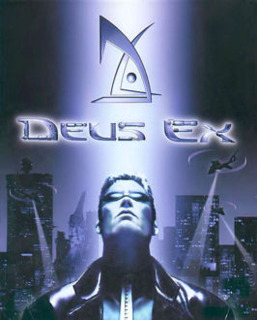A Question of Choices
The philosophy behind "Deus Ex", as in all Warren Spector games is: "Freedom of Choice". Whether one fancies stealth, vent-crawling or mindless shooting, the game allows any tactic of choice. Of course, more often than not, one approach might be harder to pull off than others, and in some cases, choosing one or the other bears little change in the end result. However, such boldness in game design is commendable, as every level can be navigated in many, many different ways.
Level design is standard fare for a 1999 game, with little information on how to navigate a level, apart from a confusing map and a number of objectives. Especially considering the open-choice structure of the game (which adds to the complexity of the maps), there really aren't enough hints to guide the player. Adding to that, scenarios aren't intuitive enough: cities either have huge expansive environments or borderline claustrophobic ones; different floors of the same building have different room configurations; structures have locked doors all around, with open entrances and stairs poping-up where you'd least expect; and equipment lies almost everywhere, from bathrooms to venting ducks. Most times, map design just looks plain random. It's not bad, but it certainly isn't "Half-life" or "Quake 2". And though "Deus Ex" might seem like a normal day FPS on the surface, the only thing it borrows from the genre is the perspective. In its core, "Deus Ex" is a run of the mill western-RPG: players' reflexes and dexterity with a mouse are seldom needed, because what dictates a hit or miss with a gun is the experience points each player has invested in pistol training. The use of weapons, special powers and items are all dictated by choices he makes.
On top of everything, as usual in an RPG, there is a plot to wrap everything up. In the future depicted by "Deus Ex", the whole world is governed by a single entity: the UN. The main character is JC Denton, a UN special ops soldier with a body full of cybernetic upgrades. He's the lead weapon against a group of anarchist terrorists that are trying to overthrow the UN regime. Of course, nothing is as it seems, and a number of plot twists will repeatedly shatter players' beliefs. There are many conspiracies to be unraveled, but unfortunately, as is common in ambitious game-plots, it promises more than it can deliver, with later revelations appearing out of place and being too reminiscent of certain books not to call them "clichés".
Most dialogues are bland, but once in a while, out of the blue, some well written political and philosophical discussions emerge; too bad they don't last longer. Characters are usually linear and predictable; Denton, however, seems schizophrenic, jumping from capitalist to anarchist (and vice-versa) faster than a blink of an eye. Unlike the action, there are few choices to make when it comes to narrative; dialog trees have mostly informative purposes and are of little consequence, which ends up distancing the player from the otherwise engrossing narrative. The ending is the exception, and one of the highlights of the game, proposing a tough choice to the player: decide the fate of the world. And believe it or not, there's no easy choice… and no happy ending. Unlike Bioware's "good vs. evil" decisions, each of the choices in "Deus Ex" is completely amoral and has little to do with right and wrong. If the story is in fact a mirror of its creator's soul, then Warren Spector is definitely a cynic, thinking little of Man or its Civilization.
Like the plot, art design and soundtrack provide a moody, gritty and dark ambiance, mixing soft techno-like music with poorly lighted environments, adding a distinct flavor to this pessimistic view of the future. It provides a similar background to that of movie aesthetics like "The Matrix" or even "Blade Runner", it's just a shame the plot isn't nearly as well conceived as in those movies.
All in all, "Deus Ex" is a wonderful game. Although ahead of its time, it lacks a certain layer of polish in nearly all of its aspects. Gameplay could have used tweaking, and better level design would have taken the game into a whole new league. Nevertheless, it is easy to apologize most of its flaws considering its revolutionary nature, and the impact it continues to have on gaming today.

